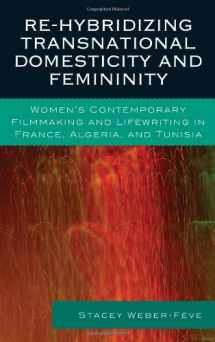
Re-Hybridizing Transnational Domesticity and Femininity: Women's Contemporary Filmmaking and Lifewriting in France, Algeria, and Tunisia (After the ... Francophone World and Postcolonial France)
ISBN-13:
9780739134511
ISBN-10:
0739134515
Author:
Stacey Weber-Fève
Publication date:
2010
Publisher:
Lexington Books
Format:
Hardcover
239 pages
Category:
Communication & Media Studies
,
Social Sciences
FREE US shipping
Book details
ISBN-13:
9780739134511
ISBN-10:
0739134515
Author:
Stacey Weber-Fève
Publication date:
2010
Publisher:
Lexington Books
Format:
Hardcover
239 pages
Category:
Communication & Media Studies
,
Social Sciences
Summary
Re-Hybridizing Transnational Domesticity and Femininity: Women's Contemporary Filmmaking and Lifewriting in France, Algeria, and Tunisia (After the ... Francophone World and Postcolonial France) (ISBN-13: 9780739134511 and ISBN-10: 0739134515), written by authors
Stacey Weber-Fève, was published by Lexington Books in 2010.
With an overall rating of 4.3 stars, it's a notable title among other
Communication & Media Studies
(Social Sciences) books. You can easily purchase or rent Re-Hybridizing Transnational Domesticity and Femininity: Women's Contemporary Filmmaking and Lifewriting in France, Algeria, and Tunisia (After the ... Francophone World and Postcolonial France) (Hardcover) from BooksRun,
along with many other new and used
Communication & Media Studies
books
and textbooks.
And, if you're looking to sell your copy, our current buyback offer is $0.48.
Description
Re-hybridizing Transnational Domesticity and Femininity examines the problems of voicing the personal when considering the role and place of women in the home. Analyzing a collection of first-person cinematic and literary narratives by Assia Djebar, Annie Ernaux, Simone de Beauvoir, Raja Amari, Coline Serreau, Leïla Sebbar, and Yamina Benguigui; Weber-Fève explores the transnational processes of identity formation, gender performance, and construction of culture and society. Through a closer look at contemporary representations of French, Algerian, and Tunisian women on the page and on the screen, this study discusses the ways in which homemaking, nation, and gender are intricately bound to one another and situated in personal history.Working within, as well as beyond, so-called national systems of visual and written representation, these women artists challenge inherited and monolithic performances, definitions, and discourses of femininity. In doing so, they create re-hybridized subjects that begin to recognize and embrace the differences within themselves. The authors and filmmakers in this study-through their female protagonists, the protagonists' homes and homemaking acts, and the investigative lens of the interrogation of the personal-are interested in exploring how the process of uncovering or articulating new and "other" identities and subjectivities ushers in new and "re-hybridized" ways of seeing, knowing, and being female.


We would LOVE it if you could help us and other readers by reviewing the book
Book review

Congratulations! We have received your book review.
{user}
{createdAt}
by {truncated_author}


